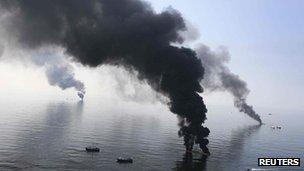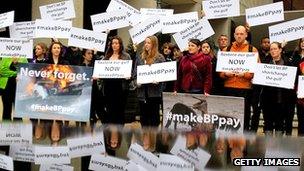BP's Gulf of Mexico compensation costs 'jeopardising' the company
- Published
- comments

Smoke rises from a controlled burning of oil on the sea around the rig site
BP's financial recovery from the disaster of the Deepwater Horizon oil spill in 2010 is being put in jeopardy by the escalating amounts being paid to businesses in the Gulf of Mexico region to compensate them for economic harm.
The UK oil giant complains that the interpretation of rules for assessing "business economic loss" are being systematically abused such that colossal sums are being handed to enterprises that suffered no detriment from the oil spill in the Gulf of Mexico.
According to an appeal document recently filed in the US courts by BP against the legally agreed settlement procedure, the company has "been ordered to pay hundreds of millions of dollars - soon likely to be billions - for fictitious and inflated losses".
BP is so worried by the potential magnitude of alleged undeserved payments it is making to companies that it is planning to ask the British prime minister and chancellor for help in persuading the US government to intervene. It is hopeful that David Cameron will raise the issue at the G8 meeting of the government of the world's richest countries, which the UK is hosting next month.
The court filing warns that BP will be "irreparably harmed" unless the compensation system is reformed fast. According to BP sources, the rate at which cash is leaking from the company could turn into a serious new financial crisis for the company, putting at risk its dividend and making it vulnerable to a takeover by another oil company.
In a little-noticed note attached to BP's first-quarter results, published last month, the company warned that the $8.2bn it has set aside to cover compensation payments will be "significantly" too little, even if its appeal against the settlement procedures is successful. And if it loses the appeal, there will be "a further significant increase to the total estimated cost".
BP also warned in its results that this settlement "is uncapped except for economic loss claims related to the Gulf Seafood industry".
The massive compensation payments stem from the comprehensive settlement agreement BP reached with damaged entities and people in April 2012, whose point was to compensate them for profits lost as a consequence of the spill. The US courts granted final approval to this settlement on 21 December last year.
Licence to claim
Under the agreement, claimants could ask for "loss of income, earnings or profits suffered" as a result of the Deepwater Horizon disaster.
What has become of deep concern to BP is the way that this loss of income or profits is calculated by businesses and approved by a court-appointed Claims Administrator.
In practice, according to BP, companies don't have to show a fall in profits as measured on normal accounting practices. All they have to show, says the court filing, is that cash flow in a specified month or months is lower than cash flow in the same month or months before the oil spill.
The fundamental flaw, according to BP, is that neither the claimants or the Claims Administrator are under an obligation to match costs in a particular period with the revenues that they generate. So that if there is a timing difference between a company incurring expenses and subsequently receiving associated income, the claimant can ask for recompense based merely on presentation of the expenses as a notional loss.

Critics of BP say the company ruined lives and livelihoods
This is in effect a licence, according to BP, for businesses to claim vast amounts of money to which they are not entitled. And what's worse, according to BP, this practice of detaching revenues and losses was formalised by a court ruling earlier this year.
One consequence is that lawyers in the affected region of Louisiana and adjacent states are urging any business which can show a fall in cash flow since the oil spill to make a claim. BP claims that "plaintiffs lawyers across the Gulf region are now openly advertising that the settlement is a way for claimants to collect payouts even if they have no losses at all".
'Travesty'
BP gives many examples of businesses which have received huge compensation payments when they have suffered no harm from the oil spill. Here are some choice ones:
1) "The Claims Administrator awarded more than $3m in base compensation to a rice farmer based on a 'simple one month delay in the receipt of 91% of the claimant's revenues,' because the bulk of the claimant's 2009 revenue was recorded in November while the bulk of its 2010 revenues was recorded in December".
2) "A construction company located in Zone D - the farthest area from the spill - was awarded $4.8m by the Claims Administrator despite 'negative revenue and other obvious revenue mis-statements' and even after the claimant had admitted its monthly records 'over-stated benchmark year profits by over $1m".
3) "An advertising firm was awarded almost $3m as a result of a $2.1m bulk purchase of advertising time in August 2010. Because this advertising purchase was not matched with the revenue to which it corresponded… the firm appeared to have an artificial monthly loss in August, followed by artificially high profits when the advertising time was used".
4) "$3.3m [was awarded] to a law office in central Louisiana, even though its profit in the year of the spill exceeded its benchmark profits by 10%".
BP says that the way its settlement is being implemented by the Courts Administrator, with the support of the Louisiana district court, is "poised to become a black mark on the American justice system", when it could have become a positive landmark because of "its ambitious size, its innovative nature and the speed with which it was negotiated to compensate injured parties".
It continues: "If this travesty is allowed to continue, BP will be irreparably harmed and future defendants will be reluctant to settle because they cannot be confident that settlement agreements will be construed textually and fairly".